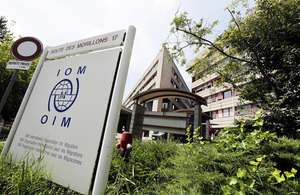IOM Council: UK Statement
The UK addressed the Council of the International Organisation for Migration, highlighting the need to move beyond a polarized debate on migration and calling for changes to crisis response.

IOM building
The United Kingdom formally congratulates the Director General on his appointment at this crucial moment for IOM; and Ambassador Negash Kebret Botora on his election as Chair. We look forward to continuing our strong partnership with IOM under Antonio Vitorino’s leadership and as IOM’s role continues to develop.
As we look ahead, it seems likely that trend of increasing international migration will continue. In many cases, migration delivers huge benefits for migrants as well as source, transit and host communities. It can be transformative in terms of increasing economic prosperity. In some cases, however, migration can also have negative effects, from exploitation or abuse of migrants; to heightened tensions between communities.
We must together move beyond polarised debates which categorise migration as entirely good or bad. The benefits or drawbacks of migration are determined by how we – societies, governments, businesses, communities – manage and respond to it. Maximising the benefits and minimising the drawbacks requires strong international cooperation - hence the United Kingdom’s endorsement of the Global Compact for Migration.
Reducing the vulnerability of migrants is a particular UK priority. Ending conflicts is key to this, yet there are few signs of conflicts abating around the world. As a consequence, humanitarian needs continue to escalate to unprecedented levels year after year. We must do more to change the way we respond to humanitarian crises - with more investment in prevention, preparedness, and early action. The UK is committed to tackling these challenges, including by spending over 50% of our overseas aid on fragile and conflict-affected states.
We welcome IOM’s support for efforts to achieve long-term stability, including through investing in early action and ensuring the most vulnerable are not left behind. IOM’s work with Internally Displaced Persons is a strong example. We are currently working with the wider UN family and Member States to set up a UN High Level Panel on IDPs, in order to consider what more can be done to support them, and we look forward to IOM’s engagement on this.
We also welcome IOM’s work to develop a new strategy and conduct a functional review, in order to set clear direction and scope for the future. The Strategy should be coherent with the wider UN reform agenda and include consideration of how IOM works with other partners. It is also a UK priority for IOM to remain a non-normative body, responsive to the needs of its membership. It is right that the strategy is a high priority; we look forward to consultation with member states throughout the strategy process.
The UK appreciates the need to strengthen IOM’s central structures and supports efforts to improve consistency and oversight, without compromising IOM’s flexibility or administrative leanness. The UK is pleased to provide core funding to support this agenda.
We welcome the IOM’s enhanced role as coordinator and lead UN body on the Global Compact on Migration (GCM). The UK has announced its endorsement of the GCM and we look forward to its implementation, including through the UN Migration Network. While much of IOM’s existing work is entirely consistent with the GCM, we will support your efforts to ensure that the GCM delivers additional value.
We appreciate the commitment to deliver inclusive results across IOM’s work. We would like to work together to further strengthen IOM’s approach to the inclusion of people with disabilities, older people and women and girls. We also welcome IOM’s commitment to the prevention of sexual exploitation and abuse and to strengthen safeguarding processes and procedures.
Finally, the UK understands the need for a solution to the current IOM building issue – and we support a well-evidenced approach to ensure that IOM’s headquarters in Geneva are fit for purpose. We appreciate the information provided so far and look forward to continued engagement throughout the process.